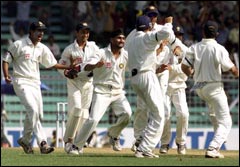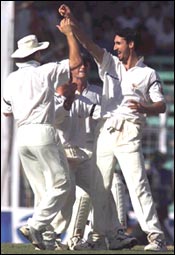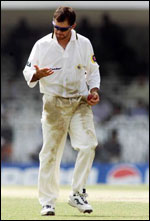

Hubris!
Prem Panicker
THE morning paper brought news of some interest -- mixed in with a sense of foreboding.
Indian captain Sourav Ganguly has, we learn, asked the national selectors to permit him to play the upcoming three day game between Board President's XI and the touring Aussies.
It is interesting, heartening even, that Ganguly feels the lack of match practice, and has asked his sponsors to postpone a commercial commitment in order that he can find time to play. He is the best player of spin in the Indian camp, the best long-hitter in the side, and the only one other than Sachin Tendulkar who can, when on song, take the attack to the opposition.
As such, his running into form is vital, and anything he does towards that end needs to be applauded. So why the foreboding?
Because the Australians never miss a trick. Because the Australians, even before the series, identified Ganguly as the man they will go after, on their time-tested theory that if the captain cracks, the team will fold under him.
I suspect, from what I hear behind the scenes, that the news that Ganguly is going to play in Delhi has the Australian camp overjoyed. They know they have him under mental pressure following two failures. And now they see, in his forthcoming appearance in Delhi, a golden chance to put the boot in, to really turn on the screws, ahead of the second Test. So you can bet your undervest that they will go after him with everything they have, at the Firozeshah Kotla, in a bid to add to his two failures in Bombay -- and if the ploy works, India will be led in the crucial second Test by a captain under enormous pressure.
 For Ganguly's -- and the team's -- sake, therefore, I like the rest of Indian cricket followers would need to keep all fingers tight crossed, and hope the captain has the fibre to stand off that challenge. One good performance in Delhi, and the pressure will swing right back on the Aussies, who will then have to worry about a rejuventated Ganguly aiding and abetting a fired-up Tendulkar.
For Ganguly's -- and the team's -- sake, therefore, I like the rest of Indian cricket followers would need to keep all fingers tight crossed, and hope the captain has the fibre to stand off that challenge. One good performance in Delhi, and the pressure will swing right back on the Aussies, who will then have to worry about a rejuventated Ganguly aiding and abetting a fired-up Tendulkar.
When you step back and look at the situation the Indian captain finds himself in, one word occurs to you as a descriptor -- hubris. The wrath of the gods.
The team is, in other words, now paying a price for not taking the Australian side seriously enough. As is the captain. Remember the words spoken by the captain just before the team landed here? "Australia has been beating third rate sides," was that how it ran?
The idiocy of making such a pronouncement apart, it reveals the mindset the team went into this tour with -- that the Aussies, finding themselves on Indian soil, would roll over and play dead. No international team with any self-respect -- and a side that has won 15 on the trot will have more than the normal amount of that commodity -- will ever fold so easily. Failing to recognise that, failing to prepare adequately for the challenge, is what has landed the team in this situation. One man -- and one man alone -- took the trouble to do his homework, to get out there in the middle and work on the areas where he saw problems, and the results of his application showed in the two innings he played.
And that brings me to the most depressing part of the current scenario. Yesterday -- Friday -- I went straight to the Taj Hotel, here in Bombay. The idea was to spend time with the various team members, get an insight into their thinking, find out how they were taking their defeat and how they planned to bounce back.
I imagined -- incredibly naive of me, I now realise -- that the team would have decided to spend a day or two together. Not in the nets, but just being together, sitting around, discussing the game, coming up with ideas, suggestions, getting back together as a unit.
 And what did I find? That every single member of the Indian squad -- barring two or three junior players -- had checked out, and flown back to their respective homes. Meanwhile, at the Cricket Club of India guest house, one lonely man sits and wonders what he can do with this lot.
And what did I find? That every single member of the Indian squad -- barring two or three junior players -- had checked out, and flown back to their respective homes. Meanwhile, at the Cricket Club of India guest house, one lonely man sits and wonders what he can do with this lot.
Harsha Bhogle was telling me yesterday how, when John Wright calls up, he always introduces himself as "Hi, I am John Wright of the Indian cricket team." A statement that shows how closely he identifies with this outfit. But what of the outfit itself? How closely do they identify with each other?
It was the evening of day two. The Indian openers had gone out there to bat, and back in the pavilion, there was a discussion of who should bat next. Dravid was slated to go in at first drop. The captain then asked Nayan Mongia to pad up in case a night-watchman was needed. Tendulkar suggested that he go in himself, in his normal position, should it be needed -- but John Wright ruled that out, arguing (quite rightly, I think) that no matter how good a batsman one is, there is always a possibility, in the dying minutes of the day, in fading light and with spectators already moving for the exits, of one miscalculation, one loss of concentration, that could prove fatal.
At this point, one of the seniormost members of the team suggested that "it might be a good idea to send Harbajan in as night watchman -- Mongia's wicket would be more valuable to the team than the offies, and therefore it needn't be risked by exposing him during the dying moments."
At which point, Ganguly snapped: 'I am the captain, I decide who goes in and when, just shut up.'
Yes, the captain is the boss. Yes, he is the final authority. Yes, the buck stops there, at his doorstep. But no captain, not the best in the world, has been able to function in a vacuum. No captain is omnipresent, omnipotent and most importantly, omniscient. The good ones listen to everybody, weigh all suggestions, then make up their own minds, and take their own decisions. To be a leader, that is a lesson that any captain -- including the gentleman who leads the Indian team -- has to learn.
Thus, when a Sachin Tendulkar walks up to the captain with a suggestion, there are two ways to deal with it. One is to listen, to accept the suggestion if it has merit or reject it if it does not -- but to encourage him, and in fact every member of the team, whether in the playing eleven or not, to keep coming up with suggestions. The other way is to banish the 'offending' player to deep fine leg and deep third man, as was done to Tendulkar.
Things are going horribly wrong within the team. That is a pity at any time -- it is doubly so when facing arguably the hardest-fighting team in contemporary cricket. There is still time to put things right -- but judging by the haste with which the team abandoned each other, it is hard to remain optimistic that an effort will in fact be made.
Ultimately, it is all about spirit. About having a stomach for the fight. About being able to take the knocks when the come, wait for the chance, and hit back. While watching the game, two incidents stuck out in memory -- as encapsulating the mindset of the opposing sides.
The first incident came in the Australian first innings. Rahul Sanghvi was getting brutalised. And suddenly, out in the middle, he found himself entirely on his own. The other ten men on the field looked embarassed, they looked everywhere but at their hapless bowler. There was no attempt to exhort, to encourage, to console, to infuse him with fresh spirit, to urge him to fight back. Instead, there as an air of complete dissociation from the proceedings -- it was almost as if the other ten players thought Sanghvi had some contagious disease, and associating with him would infect them with the same virus.
The second incident relates to the Indian second innings, in the post-lunch session of day three. Rahul Dravid and Sachin Tendulkar had seen off the threat of a morning breakthrough. They had resumed after lunch, and Tendulkar was systematically destroying the bowling. First, he targetted Gillespie and knocked him off the attack. He then went after Warne, and had him taken off the attack. Damien Fleming was reduced to bowling off breaks -- and getting them smashed about. Mark Waugh came on, went round the wicket, and got savagely pulled.
 That shot prompted a discussion between Steve Waugh, Mark Waugh and Shane Warne, all sporting concerned expressions. But as they dispersed, a voice could be heard, clearly, over the stump mikes: "Come on, guys, come on," it yelled. "Keep it up, don't let go, one wicket is all it takes, one wicket, come on guys let's do it!"
That shot prompted a discussion between Steve Waugh, Mark Waugh and Shane Warne, all sporting concerned expressions. But as they dispersed, a voice could be heard, clearly, over the stump mikes: "Come on, guys, come on," it yelled. "Keep it up, don't let go, one wicket is all it takes, one wicket, come on guys let's do it!"
There was passion in that voice. And pride. And spirit. And a fierce determination.
It was the voice of Ricky Ponting. The man who was tipped to become vice-captain of the side. The man who, a couple of days before this Test, told me that having lost that chance, thanks in large part due to his own off-field activities, did hurt. But, he added, and I found those words coming back to haunt me on Thursday afternoon, "Ultimately, mate, it doesn't matter if I am vice-captain or no. If I am good enough, my chance will come again. For now, I am just proud to be playing for the best damn team in the world!"
That was the man who, as his team wilted, stood there on the on side and yelled encouragement to his mates, exhorted them to one more effort.
The next ball was bowled. Tendulkar pulled. Langer took it on his body. Ponting saw the half chance, ran, flew threw the air, and scooped it up off the deck. The rest is, for the Indians, sorry history.
Notice the difference, between one mindset and the other? Do you suppose that tells you why one team wins, and the other loses?
Recently, during the build-up to the Test series, Indian coach John Wright had to go into the team dressing room and tell the players lounging around to get off their backsides, get out onto the pavilion and applaud SS Das, who was on the verge of completing a fifty. Contrast that with what happened when Mathew Hayden scored a century. Even as the Australian 12th man accompanied the drinks trolley out, scant minutes later, Justin Langer picked up a completely needless towel from off a rack and with that as his reason for crossing into the field, sprinted out to envelop his mate in a huge hug, the smile of delight on his face clear indication of the pride he took in a team-mate's accomplishment.
Victories are fashioned by men, and attitudes, like these.
Postscript: While writing this diary, I received a call from Rifat Jawaid, our correspondent in Calcutta. Rifat has been covering cricket, and pretty much everything else, in Calcutta for years, and has till date never faced a problem gaining access, accreditation.
So, the other day, he routinely applied for a media pass for the second Test at the Eden Gardens. And to his shock, when he called Mr Jagmohan Dalmiya's secretary late last night, he was told, categorically, that he would not be given a pass for the Test, nor would anyone else from Rediff.
 He was told, first, that dotcom journalists would not be given media passes. When Rifat pointed out that various other dotcom journalists had got their passes already, he was then told, whatever, but Rediff will not get the pass. He was given to understand that Mr Dalmiya is annoyed with us for our consistent "attacks" against the board. That he had read our stories, including the one we wrote about Dalmiya's attempts to use the Gujarat tragedy as the means to organise an India-Pakistan encounter in Sharjah at a time when the team should have been preparing for the Australian tour. "No media passes, no VIP passes, nothing for Rediff, we will see how you get into the ground," Rifat was told.
He was told, first, that dotcom journalists would not be given media passes. When Rifat pointed out that various other dotcom journalists had got their passes already, he was then told, whatever, but Rediff will not get the pass. He was given to understand that Mr Dalmiya is annoyed with us for our consistent "attacks" against the board. That he had read our stories, including the one we wrote about Dalmiya's attempts to use the Gujarat tragedy as the means to organise an India-Pakistan encounter in Sharjah at a time when the team should have been preparing for the Australian tour. "No media passes, no VIP passes, nothing for Rediff, we will see how you get into the ground," Rifat was told.
Fine with us. No quarrels, really. Why, after all, blame Calcutta for this? Rediff is headquartered in Bombay and yet, we were denied passes for the Test in what is literally our own home ground. Heck, never mind the Wankhede, Rediff was denied passes to cover the three-day game against Australia at the Brabourne Stadium, home (in more ways than one) of Shri Raj Singh Dungarpur.
All we learn from the incident is that Dalmiya does read Rediff. And therefore, these last lines are for his personal attention:
Dear Mr Dalmiya: We have heard, from many sources, that you are a man with an infinite capacity for taking pains, for attending to the least little detail. Now we have proof -- that even amidst your busy schedule, you found the time to remember Rediff, and could take the pains to blacklist us.
Now that this has been accomplished, may we request you to turn your time, and efforts, in a slightly less important direction? The Indian team has acquired some software designed to help its batsmen, and bowlers, fine tune their strategies -- and if you were watching the first Test, you will agree that the team needs all the fine-tuning it can get.
For that software to function, someone who understands the programme needs to input video images of past matches. The board does not have anyone who can do that. The gent who can, is employed by a private company. The company concerned is content to give him all the leave he wants, in order to fulfill the team's needs -- all that is required is a letter from the Board, asking his employers to permit him to help the team out.
Four weeks after that letter was requested for, the BCCI has still not found time to send it.
Therefore, the software remains unused. Harsha Bhogle, meanwhile, told us yesterday that ESPN-Star had, at the Board's request, edited and sent over 75 hours of videotapes, meant to be used with this software. That, too, remains in its packing case.
Now that Rediff has been effectively "dealt with", Mr Dalmiya (not that it is going to make the least little bit of difference -- we will still keep getting, and publishing, the stories that matter), could you turn your considerable skills, and your time, to this minor matter?
Might help -- you never know.
Prem Panicker
Mail Prem Panicker